Frankly Speaking – Autism Spectrum Disorder Across the Life Span: Challenges and Solutions
By michael c s murphy
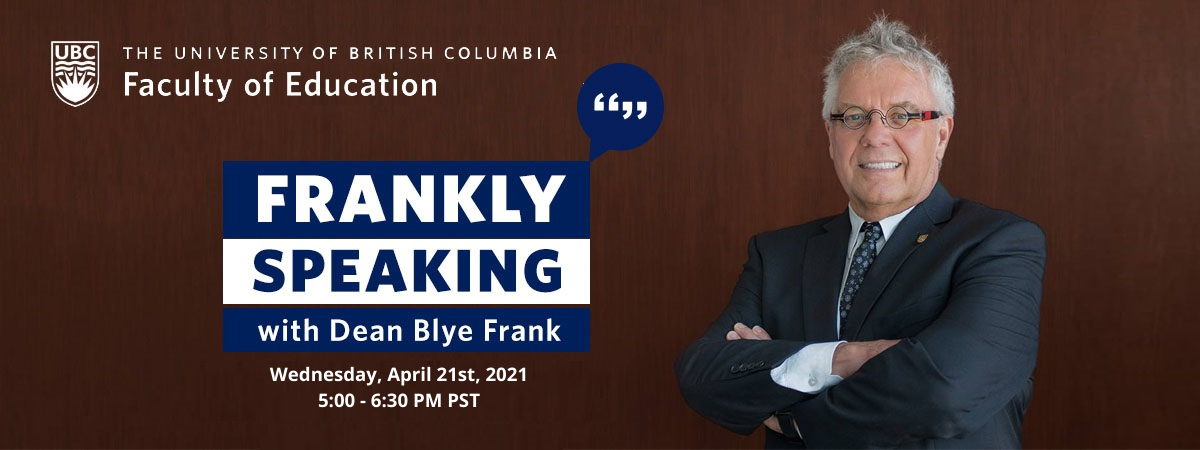
When: Wednesday, April 21, 2021
Time: 5:00 – 6:30 pm PDT
Where: Virtually
Dr. Blye Frank, Dean, Faculty of Education, the University of British Columbia, hosts the fifth installment of FRANKLY SPEAKING on Wednesday, April 21st, 2021.
Professors Pat Mirenda, Anthony Bailey, Joe Lucyshyn, and Connor Kerns, will share their knowledge and experience of working to create conditions for people touched by autism to thrive across their life span. Our panelists will bring their diverse backgrounds from Education, Medicine, and Psychology to open up debate and conversation for people and families to advance our collective understanding of autism spectrum disorder.
After the presentation, event attendees will be encouraged to ask questions to receive real-time answers from these professionals.
Frankly Speaking provides alumni and friends of UBC’s Faculty of Education with the opportunity to hear from prominent speakers on featured topics relevant to the field of education.
Featured Speakers
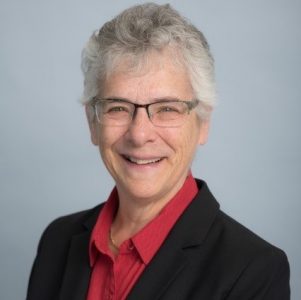
Dr. Pat Mirenda
Professor Emerita | Department of Educational & Counselling Psychology, and Special Education
READ BIO

Dr. Pat Mirenda
Professor Emerita | Department of Educational & Counselling Psychology, and Special Education
Dr. Pat Mirenda is Professor Emerita in the Department of Educational & Counseling Psychology and Special Education, and was the former Director of the Centre for Interdisciplinary Research and Collaboration in Autism (CIRCA) at the University of British Columbia. She is a doctoral-level Board Certified Behavior Analyst (BCBA-D) and taught courses at UBC on augmentative communication, autism, inclusive education, and positive behavior supports. She is a Fellow of both the American Speech Language Hearing Association (ASHA) and the International Society for Augmentative and Alternative Communication (ISAAC). She has published over 150 research articles and chapters and presents frequently at international, national, and regional conferences. Her research interests include understanding how children with autism and their families grow and develop over time, and examining the effectiveness of a parent coaching intervention for toddlers at risk for autism.
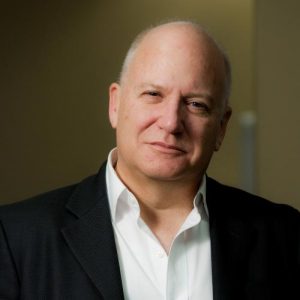
Dr. Anthony Bailey
Professor and Chair of Child and Adolescent Psychiatry, Department of Psychiatry, Faculty of Medicine
READ BIO

Dr. Anthony Bailey, BSc, MBBS, DCH, MRCPsych, FRCPC
Professor and Chair of Child and Adolescent Psychiatry, Department of Psychiatry, Faculty of Medicine
Dr. Anthony Bailey became Professor and Chair of Child and Adolescent Psychiatry at UBC in July 2010. He came from the University of Oxford where he was the Cheryl and Reece Scott Chair of Psychiatry, the first medical chair devoted to the study of autism. Dr. Bailey’s research has investigated the neurobiological basis of autistic disorders, using genetic, neuropathological and neuroimaging approaches. Until his move to Canada, Dr. Bailey coordinated the International Molecular Genetic Study of Autism Consortium: a large international team of clinicians and scientists brought together to identify susceptibility genes for autism. At Oxford, Dr. Bailey built the first Magnetoencephalographic Centre designed for the study of autism and other neurodevelopmental disorders. Dr. Bailey’s clinical work now focuses on able adults with Autism Spectrum Disorders and his current research addresses language processing and the challenges of service delivery in remote and rural communities. Dr. Bailey was the Founding Editor-in-Chief of Autism Research: the journal of the International Society of Autism Research (INSAR) and was recognized as an INSAR Fellow in 2019.

Dr. Joseph M. Lucyshyn
Associate Professor, Department of Educational & Counselling Psychology, and Special Education, Faculty of Education
READ BIO

Dr. Joseph M. Lucyshyn, PhD
Assistant Professor, Department of Educational & Counselling Psychology, and Special Education, Faculty of Education
Dr. Joseph Lucyshyn is an Associate Professor and Board Certified Behaviour Analyst (BCBA-D) in the Department of Educational and Counselling Psychology and Special Education (ECPS) in the Faculty of Education at University of British Columbia. He is Coordinator of the Behaviour Disorders Concentration and a member of the Autism/Developmental Disabilities Concentration in the Special Education Area of the ECPS Department. He teaches courses in positive behaviour support, single case research and ethics for behaviour analysts. He has published research on family centred positive behaviour support (FCPBS) in peer-reviewed journals including the Journal of Child and Family Studies, Journal of Consulting and Clinical Psychology, and Journal of Positive Behavior Interventions. He is an Associate Editor of the International Journal of Positive Behavioural Support. From 2011 to 2017, Dr. Lucyshyn served on the Board of Directors of the International Association for Positive Behavior Support (APBS), where he facilitated the establishment of APBS Networks in Hong Kong, Japan, and Taiwan. His current research focuses on group parent training models of positive behaviour support with families, mindfulness training with children with ASD and their parents, and culturally responsive positive behaviour support with families of diverse cultural backgrounds.
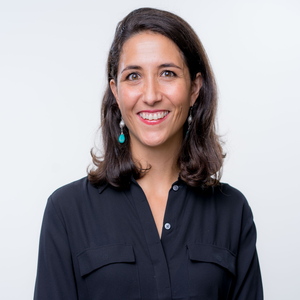
Dr. Connor Kerns
Assistant Professor, Department of Psychology
Director, Anxiety Stress and Autism Program
READ BIO
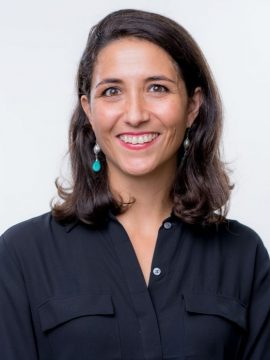
Dr. Connor Kerns
Assistant Professor, Department of Psychology
Director, Anxiety Stress and Autism Program
Dr. Kerns has conducted and published studies on broad array of topics including the role of paternal age in ASD risk, the co-occurrence of childhood psychopathologies, and differential predictors of CBT efficacy for child anxiety. Her present research focuses on the overlap, assessment and treatment of anxiety and autism spectrum disorders (ASD). Her ongoing projects aim to explore the varied presentation and phenomenology of anxiety in ASD and the implications of this variation for effective anxiety measurement and treatment. Dr. Kerns is also preparing to extend this work to the understudied area of traumatic events and their sequelae in youth with ASD. Another area of interest is the use of technology to facilitate the dissemination of empirically based treatments. Dr. Kerns is currently working to develop cost-effective, computer-assisted CBTs for youth with ASD and anxiety, interactive social stories to improve skill generalization in ASD, and video-enhanced ASD screening and educational tools. Her long terms goals include developing a parsimonious model of psychiatric co-occurrence to inform the design and dissemination of cross-diagnostic assessments and treatments that will improve child well-being and development.
Questions? Please contact education.alumni@ubc.ca






